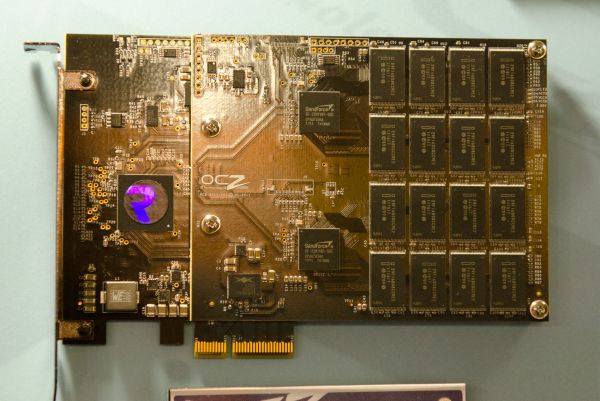Computex 2011: OCZ's RevoDrive 3 & RevoDrive 3 X2, Now With TRIM
by Anand Lal Shimpi on May 31, 2011 9:59 AM EST- Posted in
- Trade Shows
- SSDs
- SandForce
- OCZ
- SF-2000
- RevoDrive 3
- Computex 2011
There's a new PCIe SSD in town: the RevoDrive 3. Armed with two SF-2281 controllers and anywhere from 128 - 256GB of NAND (120/240GB capacities), the RevoDrive 3 is similar to its predecessors in that the two controllers are RAIDed on card. Here's where things start to change though.
In the past OCZ used a PCI-X RAID controller to keep costs down, but that's now gone. OCZ won't disclose the name of the controller vendor but a quick look at the card shows that it's native PCIe. The RevoDrive 3 itself is a PCIe 2.0 x4 card, however OCZ wouldn't confirm whether or not the controller was running at 2.0 or 1.0 speeds - just that the interface wasn't a bottleneck.
The other big improvement is that OCZ made some modifications to both the SandForce and on-board RAID controller firmware to allow everything from SMART data to TRIM to be passed through to the system host. In the past RevoDrive users were stuck with a PCIe card that couldn't be TRIMed, but with the 3 you get full TRIM support. Formatting the drive under Windows 7 or deleting files off of will result in those LBAs being TRIMed by the SF controllers.
OCZ is promising up to 900MB/s reads and 700MB/s writes (highly compressible of course). Random writes are spec'd at up to 120,000 for 4KB transfers. OCZ expects the 240GB capacity to sell for $599.
In addition to the standard RevoDrive there's an X2 version with twice the controllers:
With four controllers the RevoDrive 3 X2 is good for up to 1.5GB/s reads and 1.2GB/s writes. OCZ is quoting up to 200,000 4KB random write IOPS. Again all of these figures are using highly compressible data. Just like the base RevoDrive 3, TRIM/SMART reporting are now supported on the x2.
Capacities start at 240GB ($699) and go all the way up to 960GB.


















23 Comments
View All Comments
GuinnessKMF - Tuesday, May 31, 2011 - link
... and yet it's still more functional than chrome spinners.neotiger - Tuesday, May 31, 2011 - link
What is the random read IOPS performance of this and X2? That's the most important performance aspect of SSD.Does it have capacitors to flush data in case of power outage?
I wonder if this could be used as a poor man's FusionIO...
GullLars - Tuesday, May 31, 2011 - link
It could, but you're better off going with 2R0 M4 or Vertex 3 128GB. That's a sweet-spot for price/performance/ports/capacity. You will be close to maxing out your southbridge on both bandwidth and IOPS, but not limiting scaling.The big difference between Fusion-IO ioDrive and this is latency. To reach the same IOPS, you need about 3 times higher QD.
If you want something hardcore yet bootable, Areca 1880-ix with 4GB RAM and BBU with 4-8R0 M4 128GB will get you something making this (revodrive 3) look like an indilinx barefoot drive next to this.
Nordic Rune Project - Tuesday, May 31, 2011 - link
1,5 GB's Read and 1,2 Write are worthy speeds for an expensive card (as I expected it to be). It more than doubles the SATA 6G limits. So surely I'll get one of these for my Nordic Rune Project :)(I hope they're released to the public before or in October BTW).
vlado08 - Tuesday, May 31, 2011 - link
You can destroy this drive in about 23 days23days*24hours*60minutes*60seconds*1.2GB/s = 2 384 640 GB 240 GB*10 000 cycles = 2 400 000 GB
Olternaut - Tuesday, May 31, 2011 - link
Huh? Can someone respond to this please?vlado08 - Tuesday, May 31, 2011 - link
Enthusiasts like to bench a lot and faster speed allows them by benching to destroy the SSD faster. Also if you are editing HD video files by getting faster transfer speed (now with usb 3.0) you can move back and fort masive files more quickly and more easily and this is very tempting but rewriting big files is not good for SSD.My calculations are for constant write at maximum write speed of 1.2GB/s and for 10 000 cycles for write/erase. This is not normal usage but my poin is that faster speed allows you to do it.
GullLars - Tuesday, May 31, 2011 - link
No, actually you're wrong. Benchmarking with IOmeter and ATTO will generate close to no writes because it's just 0x0000 fill. Other benchmarks use real or incompressible data, wich is worst case for sandforce. This is a scenario known as "rouge data recorder", a bug where software writes random data sequentially at max speed to the drive at 100% load 24/7.Still, 10.000 cycles of let's say 240GB is 2400TB of data to write. Worst case is sequential incompressible data, which is roughly 360MB/s IIRC. That will give you 1,3TB pr hour = 1850 hours. That is 77 days.
Keep in mind this is what the drive is rated for at max operating temperature, and should represent a close to worst case. With RAISE, ECC, and reserved space to take worn out sectors from, i will speculate a likely D50 (half of devices dead) somewhere between 6-12 months. This is however a totally unrealistic usage scenario. For this you would go with enterprice SLC drives, with 10-50x higher endurance.
vlado08 - Tuesday, May 31, 2011 - link
"With four controllers the RevoDrive 3 X2 is good for up to 1.5GB/s reads and 1.2GB/s writes"So it is not 360MB/s bur 1.2GB/s this is 4.2TB per hour = 100.8TB per day
Probably there are virus programs which are made to worn SSD and you may not notice it if they are written to do deir work during idle times.
vlado08 - Tuesday, May 31, 2011 - link
sorry for my englishbur = but
deir = their